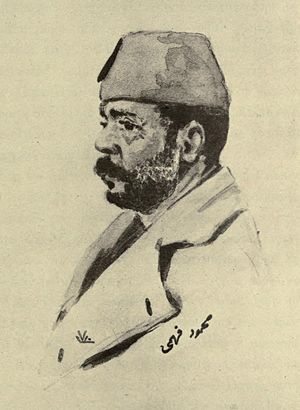Mahmoud Fehmy facts for kids
Mahmoud Fehmy was an important Egyptian army officer and engineer who lived from 1842 or 1843 to 1890. He was a strong supporter of Egyptian independence, often called an Egyptian nationalist. In 1882, he became the Minister of Public Works and the Chief Engineer for the Egyptian Army. This was during a time when Egyptians were trying to gain more control over their own country, known as the ʻUrabi revolt.
Contents
Who Was Mahmoud Fehmy?
Mahmoud Fehmy was born in Egypt around 1842 or 1843. He grew up to become a skilled military engineer, which means he was an expert in designing and building things for the army, like forts and defenses. He was also a dedicated nationalist, someone who deeply loved his country and wanted it to be free and strong.
A Key Engineer in the Egyptian Army
In 1882, Egypt faced an invasion from the British. During this time, Mahmoud Fehmy played a very important role. He was put in charge of building military fortifications by the leader of the Egyptian nationalist government, Ahmed ʻUrabi. Fortifications are strong defensive structures like walls and trenches, built to protect an area from attack.
Building Defenses
Fehmy worked hard to build these defenses. He oversaw the construction of Egyptian forts at a place called Kafr El Dawwar. He also worked on the defenses at the Battle of Tell El Kebir, which was a major battle site. However, he wasn't able to finish all the work at Tell El Kebir.
His Role in the Uprising
Mahmoud Fehmy was highly respected as a smart and capable officer and engineer. His work was crucial for the Egyptian forces trying to defend their country.
Capture and Aftermath
In late August 1882, while out for a walk with another officer, Fehmy was captured by the British. His capture was a big loss for the Egyptian army because he was so skilled. He was held as a prisoner of war by the British until the war ended.
Later in 1882, Fehmy was brought to court alongside ʻUrabi and other Egyptian generals. He was found responsible for his actions during the uprising. Fehmy and his family were sent away to Colombo, in a place called Ceylon (which is now Sri Lanka). He lived there with ʻUrabi and the other prisoners until he passed away in 1890.
 | Mary Eliza Mahoney |
 | Susie King Taylor |
 | Ida Gray |
 | Eliza Ann Grier |


